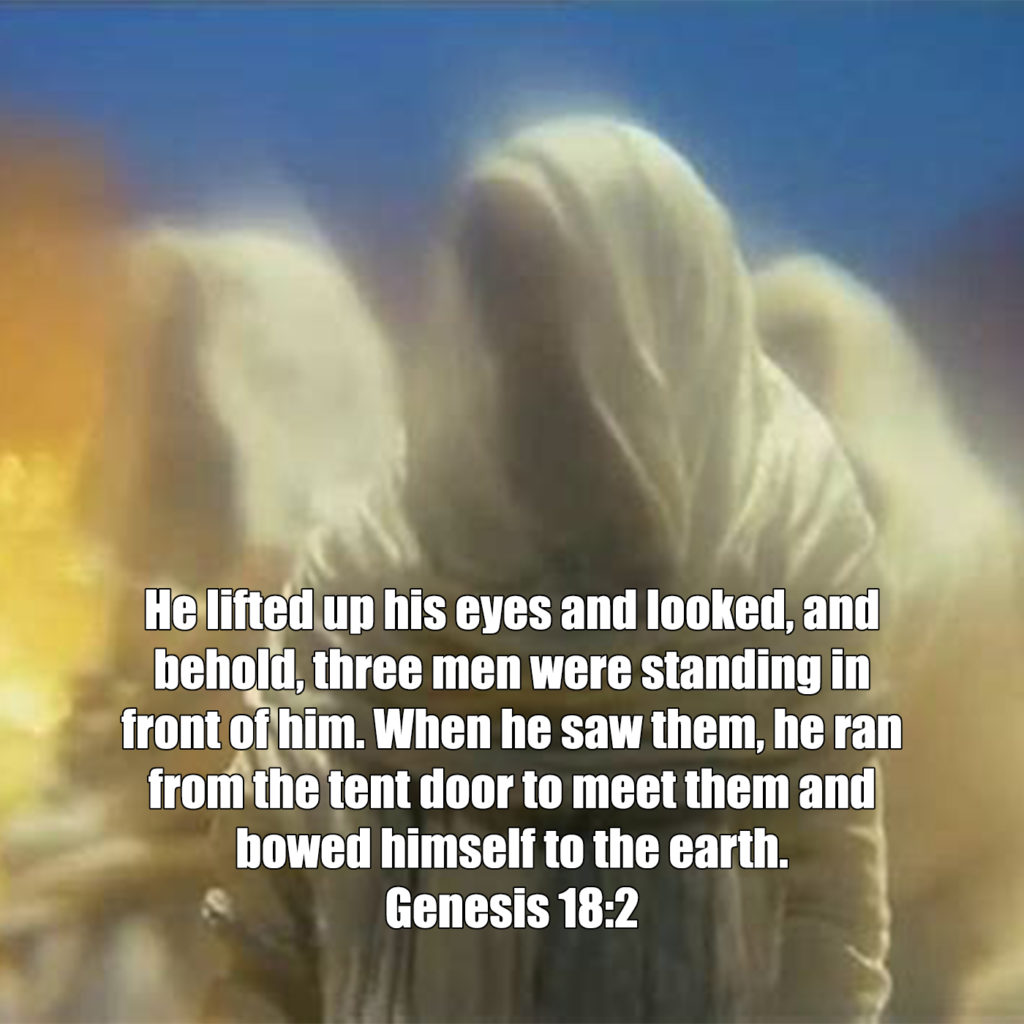
1 And the LORD appeared to him by the oaks of Mamre, as he sat at the door of his tent in the heat of the day.
After Abraham and his household have recovered from their circumcision (we know this since they are working again), God appears visibly to Abraham, as he is taking a break from work during the early afternoon, when the temperatures are usually well above 100 degrees Fahrenheit.
2 He lifted up his eyes and looked, and behold, three men were standing in front of him. When he saw them, he ran from the tent door to meet them and bowed himself to the earth 3 and said, “O Lord, if I have found favor in your sight, do not pass by your servant. 4 Let a little water be brought, and wash your feet, and rest yourselves under the tree, 5 while I bring a morsel of bread, that you may refresh yourselves, and after that you may pass on—since you have come to your servant.” So they said, “Do as you have said.”
The three figures are later revealed to be God and two angels, all three of them take the forms of men, so that they can interact with Abraham.
It is clear that Abraham recognizes one of the visitors as an authoritative figure, as he specifically calls one of them “Lord.” It could have been that Abraham recognized one of them as God, or it is likely that God appeared in more ornate clothing than the angels.
However, Abraham’s response does not immediately suggest that he recognizes the figures as divine, rather, he is offering typical Bedoin/Middle Eastern hospitality to the travelers. It was considered customary to welcome travelers into one’s home and provide them with water and a meal, so that they could withstand the desert heat, as well as to open up conversation about possible trades and buisness deals with the travelers. Whether or not Abraham recognizes God among these three visitors, he is offering them the same hospitality he would to others.
6 And Abraham went quickly into the tent to Sarah and said, “Quick! Three seahs of fine flour! Knead it, and make cakes.” 7 And Abraham ran to the herd and took a calf, tender and good, and gave it to a young man, who prepared it quickly. 8 Then he took curds and milk and the calf that he had prepared, and set it before them. And he stood by them under the tree while they ate.
Abraham offers the visitors a “morsel of Bread,” and ends up preparing a feast. This action is going above and beyond the normal requirements of Middle Eastern hospitality. It suggests that Abraham views his visitors as worthy of much honor and respect. It would be typical if a Bedouin invited in a very wealthy man to offer a sheep or goat, in addition to any promised bread. Abraham, however, offers a calf, worth much more in value than a goat. This suggests that he understands that his visitors are heavenly beings.
As they eat, Abraham, the master of the house, acts as a servant, he doesn’t join them in reclining and eating, but stands to the side, this is also atypical behavior when inviting travelers in. Usually a servant would do the work, while the master of the house would discuss buisness with the guests, Abraham humbles himself to the place of a servant before God.
The text notes that God and the angels ate the food. Being spiritual beings, they would have no need for nourishment, this suggests that for this encounter, they took on physical bodies, that could at the very least enjoy food, whether they needed it or not.
9 They said to him, “Where is Sarah your wife?” And he said, “She is in the tent.” 10 The LORD said, “I will surely return to you about this time next year, and Sarah your wife shall have a son.” And Sarah was listening at the tent door behind him. 11 Now Abraham and Sarah were old, advanced in years. The way of women had ceased to be with Sarah. 12 So Sarah laughed to herself, saying, “After I am worn out, and my lord is old, shall I have pleasure?”
While God and the angels are eating, they begin to discuss with Abraham. Though he has set himself in the place of a servant, they are still willing to discuss buisness with him. They ask about Sarah, who is in the tent, and promise that she will have a child by the next year. Sarah is listening in on the coversation from inside the tent, and cannot help but laugh at the thought of having a child at her age, especially since she has gone through menopause. The laugh seems to be one of disbelief, and not one of faith, more of a sneer than a giggle.
13 The LORD said to Abraham, “Why did Sarah laugh and say, ‘Shall I indeed bear a child, now that I am old?’ 14 Is anything too hard for the LORD? At the appointed time I will return to you, about this time next year, and Sarah shall have a son.” 15 But Sarah denied it, saying, “I did not laugh,” for she was afraid. He said, “No, but you did laugh.”
Sarah’s laugh was likely barely audible, so as to not offend God with her lack of faith. However, God still hears it. God reaffirms his stated promise, saying “Is anything to hard for the LORD?” In doing so God rebukes her lack of faith. Sarah tries to deny her lack of faith and the offence such a laugh would bring, but God knows her heart.
16 Then the men set out from there, and they looked down toward Sodom. And Abraham went with them to set them on their way.
With the meal finished, the visitors get up to go on their way, and Abraham, as is customary, goes to see them off.
17 The LORD said, “Shall I hide from Abraham what I am about to do, 18 seeing that Abraham shall surely become a great and mighty nation, and all the nations of the earth shall be blessed in him? 19 For I have chosen him, that he may command his children and his household after him to keep the way of the LORD by doing righteousness and justice, so that the LORD may bring to Abraham what he has promised him.”
We get a glance here of God making a decision. God decides to tell Abraham about His plans for Sodom and Gomorrah. His reason for doing so is simply that He has chosen Abraham, and that Abraham has been obedient to everything God has told him so far. God trusts Abraham, and trusts that Abraham will train his children to follow God.
20 Then the LORD said, “Because the outcry against Sodom and Gomorrah is great and their sin is very grave, 21 I will go down to see whether they have done altogether according to the outcry that has come to me. And if not, I will know.” 22 So the men turned from there and went toward Sodom, but Abraham still stood before the LORD.
God tell Abraham plainly that he intends to see if Sodom and Gomorrah are as bad as everyone has said. God is himself investigating to see just how wicked Sodom and Gomorrah are. Now God obviously already knows the state of Sodom and Gomorrah, how wicked they are. However he chooses to look into it personally, as He plans to destroy the cities entirely.
The two angels descend into Sodom and Gomorrah to see just how wicked the cities are, while God stays and speaks with Abraham.
23 Then Abraham drew near and said, “Will you indeed sweep away the righteous with the wicked? 24 Suppose there are fifty righteous within the city. Will you then sweep away the place and not spare it for the fifty righteous who are in it? 25 Far be it from you to do such a thing, to put the righteous to death with the wicked, so that the righteous fare as the wicked! Far be that from you! Shall not the Judge of all the earth do what is just?”
Abraham realizes that God plans on destroying the cities. He also knows very well that his nephew, Lot, lives in Sodom. Abraham also helped rescue the people of Sodom in the past. He intercedes for Sodom, essentially seeing if God, the righteous judge would be willing to destroy the righteous people within the cities in order to bring judgement on the wicked. He pleads before God to spare the entire population for the sake of 50 righteous people.
26 And the LORD said, “If I find at Sodom fifty righteous in the city, I will spare the whole place for their sake.”
27 Abraham answered and said, “Behold, I have undertaken to speak to the Lord, I who am but dust and ashes. 28 Suppose five of the fifty righteous are lacking. Will you destroy the whole city for lack of five?” And he said, “I will not destroy it if I find forty-five there.”
God agrees to Abraham’s prayer to spare the righteous. This leads to a bit of negotiating on Abrahams part. Abraham continues to humble himself before God and begs for mercy if only 45 righteous people are found. God again agrees.
29 Again he spoke to him and said, “Suppose forty are found there.” He answered, “For the sake of forty I will not do it.” 30 Then he said, “Oh let not the Lord be angry, and I will speak. Suppose thirty are found there.” He answered, “I will not do it, if I find thirty there.” 31 He said, “Behold, I have undertaken to speak to the Lord. Suppose twenty are found there.” He answered, “For the sake of twenty I will not destroy it.” 32 Then he said, “Oh let not the Lord be angry, and I will speak again but this once. Suppose ten are found there.” He answered, “For the sake of ten I will not destroy it.”
The negotiating continues, Abraham in a state of upmost humility, continues to push his luck and negotiates a lower and lower range of righteous people for which God agrees to spare the cities. From Abraham’s responses we get a sense that he fears that God may become angry with him, and that he is afraid to make demands of God. However God agrees to spare the cities if he is able to find even just 10 righteous people living there.
During this exchange, Abraham learns a lot about the heart of God. God is no more willing to punish the wicked at the expense of the righteous than Abraham was. In fact God showed extreme amounts of mercy toward these two cities.
33 And the LORD went his way, when he had finished speaking to Abraham, and Abraham returned to his place.
Perhaps unwilling to negotiate any lower, and perhaps because he is amazed at what God agreed to, Abraham is ready to return home, assured of God’s goodness. God however continues in his plan to destroy Sodom and Gomorrah.
